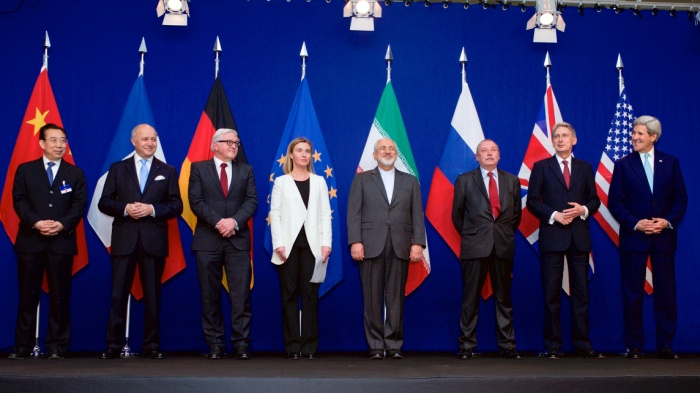JCPOA and the Point of No-Return

By: Seyyed Mohammad-Sadegh Kharrazi
The Iranian year of 1394 [March 21, 2015-March 2016] was an exceptional year in the history of diplomacy. The nuclear agreement rocked domestic politics in both Iran and the United States, and created seismic shifts and fault lines in diplomatic ties of Tehran and Washington with other countries. The Joint Comprehensive Plan of Action, the JCPOA, served as the most powerful instance of diplomatic approach based on soft power. No wonder why its critics on both sides in Iran and the United States, besides Saudi Arabia and Israel raised their voice in defense of hard power-based measures. Outside Iran, they called for imposition of a security-oriented attitude on the political nuclear dispute, and demanded a solution that functioned through war, pressure and sanctions.
The world, however, opted for negotiation. Neither the Saudi petrowealth nor the Israeli self-victimization could undermine the diplomatic determination of the parties involved in nuclear talks and an outstanding diplomatic process sidestepped pressures by the United States' strategic allies. The political mobilization deployed by powerful groups inside both Iran and the United States also failed to influence the process of nuclear talks. Parliamentary opposition and partisan threats could not counter public demand and unison between the state and the citizens.
On the Iranian side, this should be acknowledged as the most definitive feature of the state's power: opting for prudent diplomacy, and employing two of the three forma tenets of diplomacy in the Islamic Republic, namely wisdom and expedience to guarantee the third tenet, i.e. dignity. JCPOA took shape in the absence of reasonable alternatives that could bring maximum benefits and inflict minimum cost. Many cast doubt on the survival of JCPOA, suggesting that the US presidential elections and the possibility of a Republican replacing Barack Obama may strike a blow to this fragile agreement. However, JCPOA's survival has been guaranteed, not because of the futility of Israel's or Saudi Arabia's vehement resistance, or the failure of the pro-Israel lobby in Washington, but the long line of trade delegations from the east and the west that are visiting Iran, and the empty hands of JCPOA's critics to offer an alternative. There is no going back to the pre-JCPOA era.
The nuclear agreement is not based on trust, but on verification. What potentially undermines the JCPOA is not the will of either side, but their violation of the terms of the agreement. There will be no Saddam Hussein to tear up the Algiers Accord in front of the TV cameras and to beat the drums of war. Any American politician who dream of ripping up the nuclear agreement on their first day in the White House is only proving their lack of knowledge about the basics of international relations: in JCPOA there is no point of return. The deal is a burden on the shoulders of the next generation of politicians who hold power, and not a legacy to be jeopardized with adventurism.
Iran's President Hassan Rouhani once compared the nuclear negotiations to a game in which both sides scored and received goals. Extending this metaphor, clearly one cannot simply run into the pitch, call the end of the game and turn the pitch into a boxing ring. After the nuclear deal, this is a game of political, and not security, rules. Perhaps the most convincing proof for this new age is the recent UN Security Council meeting on Iran's missile tests which ended inconclusively and with no statement since the tests were deemed not violating the JCPOA. Those [domestic] critics who claim that Iran's dossier is still considered under Chapter VII of the UN Charter will have a hard time to explain the UN Security Council's decision over Iran's recent missile test.
With JCPOA came an end to security-oriented approaches towards Iran, and reinforcement of Iran's role as a reliable partner in bringing stability back to the Middle East. After years of absence, our country has returned to the Middle East's regional security arrangements. Saudi Arabia, who benefitted this absence, struggles to keep its Western allies away from Iran under the excuse of Iran's interventionist approach while its own interventions have led to the war in Yemen, the destruction in Syria, the rupture in Iraq, and the emergence of ISIS. Iran, on the other hand, thanks to the sacrifices of the likes of General Qasem Soleimani and the resultant deterrence power, is establishing peace and security in the region. The JCPOA both owes to these efforts and reinforces them. No wonder why critics of the nuclear talks have targeted Iran's security-establishing efforts in the region after establishment of the JCPOA.
The Iranian year of 1395 will be the beginning of a new era for Iran and the region. Under the leadership of Ayatollah Khamenei and policies of the government and the foreign ministry, we can be hopeful to reap the fruits of JCPOA, an agreement which is already showing its regional effects.
* Seyyed Mohammad-Sadegh Kharrazi is former head of Iran's mission to the UN, former ambassador to France during the presidency of Mohammad Khatami, and editor-in-chief of Iranian Diplomacy.

